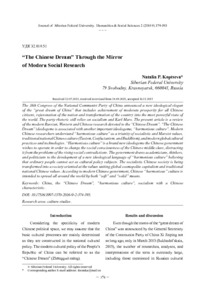“The Chinese Dream” Through the Mirror of Modern Social Research
Скачать файл:
URI (для ссылок/цитирований):
https://elib.sfu-kras.ru/handle/2311/20100Автор:
Koptseva, Natalia P.
Копцева, Н.П.
Дата:
2016-02Аннотация:
The 18th Congress of the National Communist Party of China announced a new ideological slogan
of the “great dream of China” that includes achievement of moderate prosperity for all Chinese
citizens, rejuvenation of the nation and transformation of the country into the most powerful state of
the world. The party rhetoric still relies on socialism and Karl Marx. The present article is a review
of the modern Russian, Western and Chinese research devoted to the “Chinese Dream”. “The Chinese
Dream” ideologeme is associated with another important ideologeme, “harmonious culture”. Modern
Chinese researchers understand “harmonious culture” as a triunity of socialistic and Marxist values,
traditional national Chinese culture (Taoism, Confucianism, and Buddhism), and modern global cultural
practices and technologies. “Harmonious culture” is a brand new ideologeme the Chinese government
wishes to operate in order to change the social consciousness of the Chinese middle class, distracting
it from the problems of the rising social contradictions. The government draws academicians, thinkers,
and politicians to the development of a new ideological language of “harmonious culture” believing
that ordinary people cannot act as cultural policy subjects. The socialistic Chinese society is being
transformed into a society oriented at the values uniting global cosmopolite capitalism and traditional
national Chinese values. According to modern Chinese government, Chinese “harmonious” culture is
intended to spread all around the world by both “soft” and “solid” means XVIII съезд Коммунистической партии Китая провозгласил новый идеологический лозунг
о «великой китайской мечте», которая включает в себя достижение среднезажиточного
уровня жизни для всех китайцев, омолаживание нации и превращение китайского
государства в самое могущественное государство мира. При этом в партийной риторике
китайского правительства сохраняется опора на социализм, на теорию Карла Маркса. В
статье представлен обзор современных российских, западных и китайских исследований,
посвященных «китайской мечте». Идеологема «китайской мечты» связана с другой
важной идеологемой – «гармоничная культура». Современные китайские исследователи
понимают «гармоничную культуру» как триединство ценностей социализма и марксизма,
традиционной национальной китайской культуры (даосизма, конфуцианства, буддизма)
и современных глобальных культурных практик и культурных технологий. «Гармоничная
культура» представляет собой принципиально новую идеологему, с помощью которой
китайское правительство хочет изменить общественное сознание среднего китайского
класса, переориентировать его от проблем нарастающих социальных противоречий.
К разработке нового идеологического языка «гармоничной культуры» китайское
правительство призывает академиков, мыслителей, политиков, полагая, что субъектами
культурной политики не могут быть обычные рядовые люди. Происходит трансформация
социалистического китайского общества в общество, ориентированное на ценности,
соединяющие глобальный космополитический капитализм и традиционные национальные
китайские ценности. Китайская «гармоничная» культура, с точки зрения современного
китайского правительства, с помощью «мягких» и «твердых» способов должна постепенно
распространиться по всему миру
Коллекции:
Метаданные:
Показать полную информациюСвязанные материалы
Показаны похожие ресурсы по названию, автору или тематике.
-
Китайский Хабаровск: роль мигрантов в формировании городских пространств
Леонтьева, Э. О.; Ван На; Leonteva, Elvira O.; Van Na (Journal of Siberian Federal University. Сибирский федеральный университет, 2024-10)В статье на основе эмпирического материала рассматриваются сферы присутствия китайских мигрантов в российских городах, которые раньше находились на периферии исследовательского интереса, такие как общепит, бытовые ... -
Basic Concepts of Chinese National Religious and Philosophical Doctrines: an Introduction to Social Philosophical Study of Chinese Society
Sorokopud, Sergey N.; Сорокопуд, С.Н. (Сибирский федеральный университет. Siberian Federal University., 2014-03)The notion of basic concept of culture is substantiated in the article. A new definition of the concept is given. The history of formation of the notion concept, its differences from the category and concepts are previously ... -
Socio-Philosophical Analysis of the Basic Concepts Outlined in His Treatise Tao Te Ching, Based on the Author’s Translation-Interpretation
Sorokopud, Sergey N.; Сорокопуд, С.Н. (Сибирский федеральный университет. Siberian Federal University., 2014-01)The article presents the results of a new (authorized) translation of the ancient Chinese text by Lao Tzu Tao Te Ching. This ancient text in the world of science is a representative of basic concepts of Chinese culture, ... -
The National and the International in Three Works of Contemporary Chinese Artists
Sitnikova, Aleksandra A.; Ситникова, А.А. (Сибирский федеральный университет. Siberian Federal University, 2020-06)The article formulates and analyses a hypothesis, according to which, thanks to modern postmodern art, a single international visual language was formed in the late 20th – early 21st centuries, and previously mysterious ... -
Конструирование медиаобраза СВО в китайских массмедиа
Нагибина, И. Г.; Куликова, Л. В.; Чжан, Ю.; Nagibina, Irina G.; Kulikova, Ludmila V.; Zhang, Yu. (Siberian Federal University. Сибирский федеральный университет, 2024-05)В современном информационном обществе политическая сфера тесно переплетена с медиапространством, в связи с чем соприкосновение происходит не с политической реальностью, а с ее медиарепрезентацией. Объективная реальность многих ...

